-
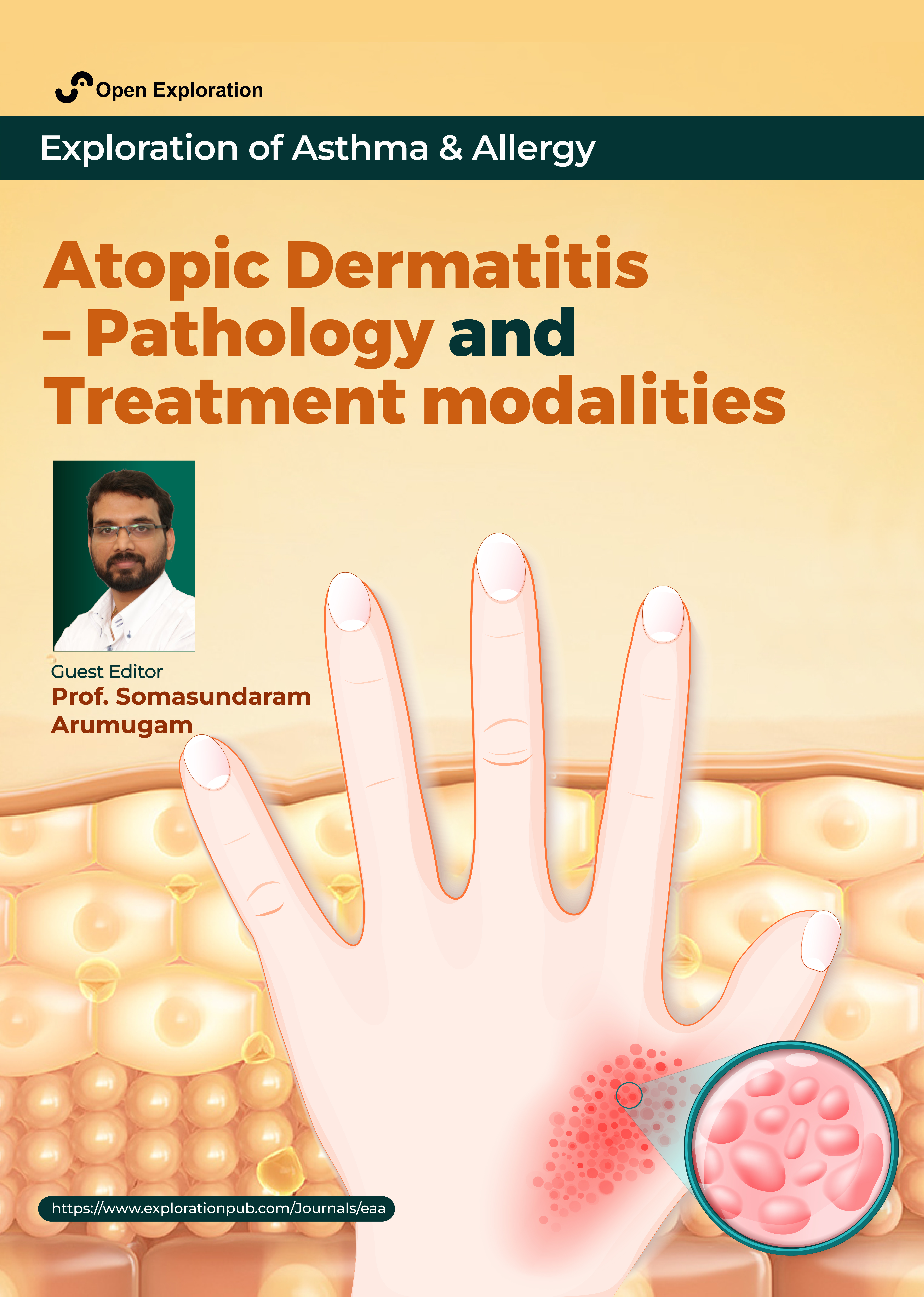 Special Issue Topic
Special Issue TopicAtopic Dermatitis – Pathology and Treatment modalities
Submission Deadline: September 30, 2024Guest Editor
Prof. Somasundaram Arumugam E-Mail
Assistant Professor, Department of Pharmacology & Toxicology, National Institute of Pharmaceutical Education and Research (NIPER) - Kolkata, India
Research Keywords: Inflammation, inflammatory disorders, immune response, natural products, pharmacology, drug screening, toxicology
About the Special Issue
Atopic dermatitis (AD), also known as eczema, is a chronic inflammatory skin condition that often appears as red, itchy rashes. Its exact cause isn't fully understood, but it's believed to involve a combination of genetic, environmental, and immune system factors. People with AD often have a compromised skin barrier, which allows moisture to escape and irritants or allergens to enter, leading to dryness and inflammation. Similarly, an overactive immune response plays a role in the inflammation and itching associated with AD. Certain immune cells release chemicals that cause skin irritation and itching. In addition, mutations in genes responsible for maintaining the skin barrier function and regulating the immune system contribute to its development.
This special issue will focus on recent advances in atopic dermatitis research, its pathophysiology, preclinical and clinical studies for drug discovery, including complementary approaches for its treatment. Contributions are welcome from both clinicians as well as basic researchers involved in all aspects of AD research and healthcare. Biomarker and disease target identification for AD is also solicited for this special issue.
Keywords: Atopic dermatitis, allergy, hypersensitivity, natural products, animal models, mast cells, inflammation
Call for Papers
Published Articles
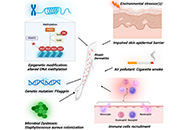 Pathogenesis and management of atopic dermatitis: insights into epidermal barrier dysfunction and immune mechanismsOpen AccessReviewAtopic dermatitis (AD) is a chronic inflammatory skin disease characterized by a compromised epidermal barrier and heightened immunoglobulin E (IgE) levels, often associated with filaggrin (FLG) gen [...] Read more.Antara Baidya, Ulaganathan MabalirajanPublished: February 07, 2025 Explor Asthma Allergy. 2025;3:100973
Pathogenesis and management of atopic dermatitis: insights into epidermal barrier dysfunction and immune mechanismsOpen AccessReviewAtopic dermatitis (AD) is a chronic inflammatory skin disease characterized by a compromised epidermal barrier and heightened immunoglobulin E (IgE) levels, often associated with filaggrin (FLG) gen [...] Read more.Antara Baidya, Ulaganathan MabalirajanPublished: February 07, 2025 Explor Asthma Allergy. 2025;3:100973
DOI: https://doi.org/10.37349/eaa.2025.100973 The evolving therapeutic landscape in atopic dermatitisOpen AccessReviewAtopic dermatitis (AD) is a prevalent chronic inflammatory skin disorder affecting millions worldwide, with significant variations in clinical presentation influenced by socioeconomic, racial, and e [...] Read more.Luis Angel Hernández-Zárate ... Víctor González-UribePublished: January 14, 2025 Explor Asthma Allergy. 2025;3:100966
The evolving therapeutic landscape in atopic dermatitisOpen AccessReviewAtopic dermatitis (AD) is a prevalent chronic inflammatory skin disorder affecting millions worldwide, with significant variations in clinical presentation influenced by socioeconomic, racial, and e [...] Read more.Luis Angel Hernández-Zárate ... Víctor González-UribePublished: January 14, 2025 Explor Asthma Allergy. 2025;3:100966
DOI: https://doi.org/10.37349/eaa.2025.100966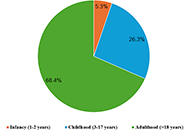 Atopic dermatitis in adults: prevalence, clinical pattern, and contact sensitizationOpen AccessOriginal ArticleAim: Few reports on atopic dermatitis (AD) in adults from Africa exist in the literature. AD in adults can occur as childhood-onset, in which AD begins in childhood and continues till adulthood, [...] Read more.Perpetua U. Ibekwe ... Bob A. UkonuPublished: September 06, 2024 Explor Asthma Allergy. 2024;2:450–460
Atopic dermatitis in adults: prevalence, clinical pattern, and contact sensitizationOpen AccessOriginal ArticleAim: Few reports on atopic dermatitis (AD) in adults from Africa exist in the literature. AD in adults can occur as childhood-onset, in which AD begins in childhood and continues till adulthood, [...] Read more.Perpetua U. Ibekwe ... Bob A. UkonuPublished: September 06, 2024 Explor Asthma Allergy. 2024;2:450–460
DOI: https://doi.org/10.37349/eaa.2024.00057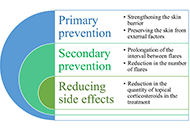 Current approach to moisturizer and emollient utilization in atopic dermatitis: a reviewOpen AccessReviewAtopic dermatitis (AD) is a chronic inflammatory skin disease that primarily affects the barrier function of the skin in patients. The condition has been documented to cause xerosis in patients from [...] Read more.Serap MadenPublished: August 27, 2024 Explor Asthma Allergy. 2024;2:441–449
Current approach to moisturizer and emollient utilization in atopic dermatitis: a reviewOpen AccessReviewAtopic dermatitis (AD) is a chronic inflammatory skin disease that primarily affects the barrier function of the skin in patients. The condition has been documented to cause xerosis in patients from [...] Read more.Serap MadenPublished: August 27, 2024 Explor Asthma Allergy. 2024;2:441–449
DOI: https://doi.org/10.37349/eaa.2024.00056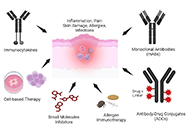 Revisiting immunotherapeutic strategies for the management of atopic dermatitisOpen AccessReviewAtopic dermatitis (AD) represents the most common inflammatory skin disease with a highly intricated immune fingerprint. Until recently, AD management mostly relied on topical corticosteroids, calci [...] Read more.Gael Tchokomeni Siwe ... Stefan BarthPublished: August 09, 2024 Explor Asthma Allergy. 2024;2:373–398
Revisiting immunotherapeutic strategies for the management of atopic dermatitisOpen AccessReviewAtopic dermatitis (AD) represents the most common inflammatory skin disease with a highly intricated immune fingerprint. Until recently, AD management mostly relied on topical corticosteroids, calci [...] Read more.Gael Tchokomeni Siwe ... Stefan BarthPublished: August 09, 2024 Explor Asthma Allergy. 2024;2:373–398
DOI: https://doi.org/10.37349/eaa.2024.00052 -
-
Ongoing Special Issues
-
Completed Special Issues